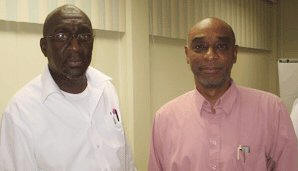
| NEWSROOM |
|
|
 |
|
|
|
|
|
|||
|
By |
||||
 |
February 25, 2010 - The Eastern
Caribbean Civil Aviation Authority (ECCAA) has reported the bodies of
Rosemond W. James, Director General, and Gregory A. McAlpin,
Director-Flight Safety, were retrieved from the earthquake that struck
Haiti on January 12, 2010. On Tuesday, the Civil Aviation Authority of
Haiti (OFNAC), one of the entities representing ECCAA in the recovery
efforts, reported the remains of Messrs James and McAlpin were
recovered. Although the bodies were identified based on their jewelry and their driver's license, secondary confirmation through a laboratory identification process will be conducted by end of this week. When this is completed, the repatriation process will take place. |
|||
|
Greg
McAlpin and Rosemond James |
||||
|
James and
McAlpin had been staying at The Montana Hotel which collapsed in the
capital, Port au Prince. The two officials had travelled to
The Board of
Directors of Eastern Caribbean Civil Aviation Authority has
appointed an interim team to take the organization forward. A
recommendation has been forwarded to the Heads of Government and
Ministers of Civil Aviation in the OECS for the endorsement of Mr.
Donald McPhail to act as the Director General of the ECCAA.
The Eastern
Caribbean Civil Aviation Authority (ECCAA) evolved from the
Directorate of Civil Aviation - Eastern Caribbean States, which may
be considered as one of the oldest, if not the oldest institutions
in the |
||||
|
A Director of
Civil Aviation was first appointed in 1957, by the Government of the
Dissolution of the
In October 2003,
at St Georges,
Five Member States
of the OECS are signatories to the Chicago Convention, which established
the International Civil Aviation Organization (ICAO). Accordingly, they
are obligated to meet the Standards and Recommended Practices (SARPS)
enshrined in ICAO's eighteen annexes. They agree on certain principles
and arrangements in order that international civil aviation may be
developed in a safe and orderly manner. They must collaborate to the
highest degree to achieve standardization and harmonization in
regulations, rules, standards, procedures and practices. Thus, they
should establish and implement a system that enables them to
satisfactorily discharge their obligations and responsibilities.
ECCAA provides
civil aviation safety and security oversight through a system of
inspecting, investigating, monitoring and licensing; and regulate civil
aviation activities in all Member States consistent with ICAO SARPS. |
| ?AvStop
Online Magazine
Contact
Us
Return To News
|
|